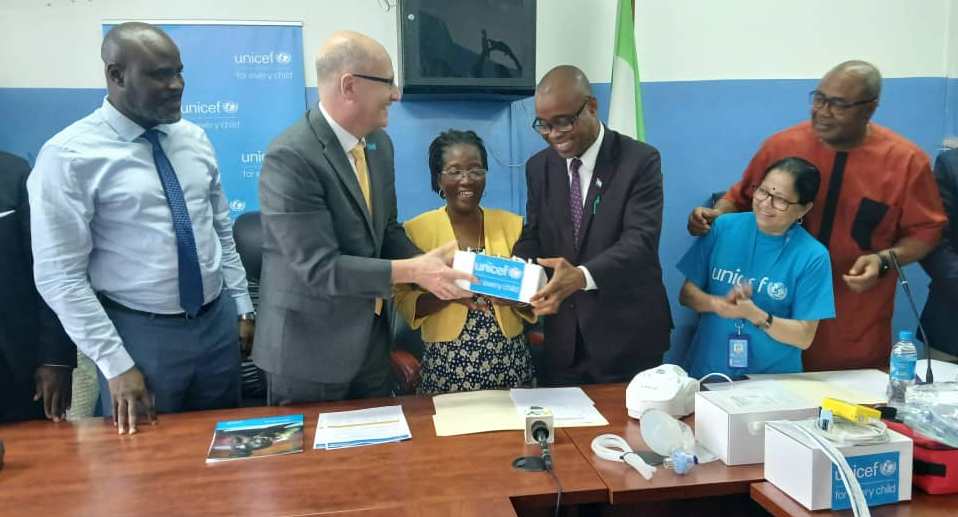By Lemuella Tarawallie
UNICEF Sierra Leone yesterday handed over oxygen therapy equipment and accessories worth over US$300,000 to the Ministry of Health.
The equipment and accessories include 64 oxygen concentrators, 140 filters sets, 60 flow splitters, 1,000 nasal catheters, 296 pulse oximeters, 216 resusitators, 288 oxygen sensors, 30 sets of spare kits, 30 tubing sets, and 72 nebulizers .
During the official handing over at the Ministry of Health’s conference room at Youyi Building, Brookfields in Freetown, the UNICEF Country Representative, Rudolf Schwenk, stated that “it is really a significant step today in Sierra Leone’s mission to reduce maternal and child deaths as these life-saving supplies will support the effective diagnosis treatment of oxygen deficiency (hypoxemia) in new born and even children under five, pregnant and lactating women at selected Peripheral Health Units (PHUs) in Bo, Bonthe, Moyamba, Pujehun, Kenema, Kono, Kailahun, Bombali, Tonkolili, Koinadugu, Kambia, Port Loko, and Falaba Districts.”
Rudolf Schwenk added that these critical oxygen equipment, valued at more than US$300,000, were funded by UNICEF’s Humanitarian Action for Children Programme and the Government of the Republic of South Korea. He noted that the event of the handing over of the equipment and accessories marked the initiative of the Ministry of Health to decentralize the availability and use of medical oxygen in Primary Health Care facilities, and that that was very important because of “the high prevalence of pneumonia and hypoxemia in the country”.
He stated further that as they were handing over the equipment and accessories to the Ministry of Health, “UNICEF trusts that the Ministry of Health will take all the necessary measures to ensure that the equipment, supplies, and consumables are used appropriately” and that routine preventive maintenance would be carried out as required.
The Chief Medical Officer in the Ministry of Health, Dr Sartie Kenneh, stated that he was proud to let the public know that the oxygen equipment and accessories handed over to them would strengthen the area of Child Survival Strategy, not only in the hospitals but down to community level.
Dr Kenneh added that the equipment and accessories were a very big stepping stone in the Government’s efforts in trying to reduce infant and child mortality in the country, and craved UNICEF’s indulgence to give energy power supply to the facilities where the equipment and accessories would be allocated.
The Deputy Minister of Health I, Dr Charles Senessie, stated that as a Ministry, they wanted to thank and expressed their appreciation to UNICEF for not only the donation of the items but for the continued collaboration. He pledged that the donated items would be used for their intended purposes.
The handing over ceremony was climaxed with the signing of Assets Transfer Forms by the UNICEF’s Country Representative and Dr Charles Senessie.


